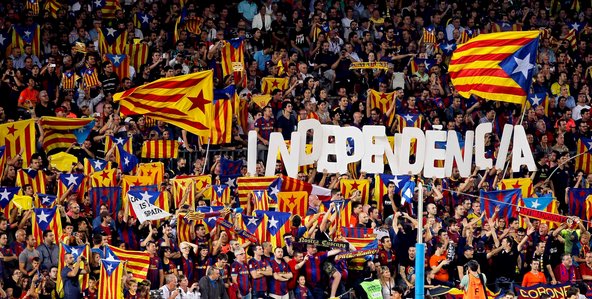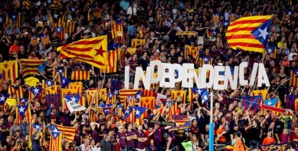The supporters of independence won the elections in Catalonia, which took place on Sunday, September 27 at a high voter turnout for the region - 77 percent. Catalan government called the vote "plebiscitary". After all, in fact, 5.5 million voters were asked to choose between independence by voting for the separatist party, and united Spain, casting their voice to political associations, defending the status quo. The central government did not recognize plebiscitary nature of the elections. Madrid assures that will not allow the separatism.
A coalition of separatists, represented by the liberal party “Democratic Convergence of Catalonia”, the Left Republicans, as well as a number of nationalist movements and groups, received 62 of the 135 seats in the regional parliament. Professor of Political Science University of Madrid Juan Rodriguez Yuste stated in this regard, that the coalition will have to team up with a leftist separatist party “Popular Unity Candidacy”, which received 10 mandates, in order to gain up the majority needed to form a government.
The political scientist said that the victory of pro-independence "cannot be considered a full-fledged." The fact that the seats in parliament were mainly provided by rural areas, where - according to the current system - votes fewer than in the cities are required to elect deputies.
So, actually less than half of the electorate - 47 percent - voted for the separatists. "Despite the apparent lack of social consensus on the independence, its supporters still intend to carry out their plans," – complains Rodriguez Yuste. They have even already developed a "road map". This is a plan of measures that are designed to bring Catalonia to the creation of their own state in the next 18 months.
According a representative of the separatist coalition Montse Bernal, Catalan Parliament must first adopt a "Declaration on the early acquisition of sovereignty." It will be followed by the creation of "national unity government". However, it will include only members of the winners’ alliance. It shall prepare the new state’s constitution, as well as create a "government agencies": the tax and judicial authorities, the army and the police, the administrative apparatus and telecommunications infrastructure, the diplomatic service and so on.
Bernal noted that after 8-9 months, Catalonia should "get out of the legal field in Spain, that is, to aquire all the state functions." The separatists are planning to complete the process of separation from Spain, the adoption of the constitution in a referendum and new parliamentary elections – in the new sovereign state.
The "road map" says that if Spain try to hinder these plans, then independence can be declared ahead of time. Gaining sovereignty is explained by the need "to create the conditions for the maintenance of liberty, prosperity and employment in Catalonia."
The government of Spain, which says it will not allow Catalonia to quite the state, has all legal means of influencing the separatists – says an employee of the Ministry of Justice of Spain, JD Julio Rodriguez Peña. The law allows the Constitutional Court on the suit of the government "to cancel the declaration of independence and to bring to justice any person accused of separatism, including those who have parliamentary immunity." Another way to preserve unity - "the abolition of the regional government and the introduction of direct rule from Madrid based on Article 155 of the constitution of the country."
In parallel with such a rule, a state of emergency can be declared in the separatist region. In this case, according to experts, maintaining order rests on the army and other security agencies. "The government expects to resolve the problem through political means, realizing that forceful measures will cause discontent in the Catalan society and lead to the outbreak of violence by the radical pro-independence", - summed up Julio Rodriguez Peña.
Professor Rodriguez Yuste believes that the elections in Catalonia "led to political uncertainty, not only in the region but in Spain as a whole." In December, the country faces elections in the central parliament. "If the government will not deter the plans of separatists, the Spaniards (most of them are in favor of the country’s unity), will punish the ruling People's Party, voting for other political forces," - says the professor. He does not rule out that in such a situation, populists from the party "Podemos", a clone of the Greek SYRIZA, may come to power.
In addition, in his opinion, the implementation of plans for Catalan separatists "could trigger a chain reaction in other regions with similar tendencies" - in the Basque Country, Galicia and the Canary Islands. Economics is among other consequences, too. "The prospects, associated with the plans of the separatists, has already caused a negative impact on the process of economic recovery from the crisis," - said Rodriguez Yuste. According to him, only in July 2015, the country has lost nearly 20 billion euros of foreign investment. It is, first of all, relates to the flight of foreign capital, which does not want to take risks in terms of political instability.
Original by Deutsche Welle
A coalition of separatists, represented by the liberal party “Democratic Convergence of Catalonia”, the Left Republicans, as well as a number of nationalist movements and groups, received 62 of the 135 seats in the regional parliament. Professor of Political Science University of Madrid Juan Rodriguez Yuste stated in this regard, that the coalition will have to team up with a leftist separatist party “Popular Unity Candidacy”, which received 10 mandates, in order to gain up the majority needed to form a government.
The political scientist said that the victory of pro-independence "cannot be considered a full-fledged." The fact that the seats in parliament were mainly provided by rural areas, where - according to the current system - votes fewer than in the cities are required to elect deputies.
So, actually less than half of the electorate - 47 percent - voted for the separatists. "Despite the apparent lack of social consensus on the independence, its supporters still intend to carry out their plans," – complains Rodriguez Yuste. They have even already developed a "road map". This is a plan of measures that are designed to bring Catalonia to the creation of their own state in the next 18 months.
According a representative of the separatist coalition Montse Bernal, Catalan Parliament must first adopt a "Declaration on the early acquisition of sovereignty." It will be followed by the creation of "national unity government". However, it will include only members of the winners’ alliance. It shall prepare the new state’s constitution, as well as create a "government agencies": the tax and judicial authorities, the army and the police, the administrative apparatus and telecommunications infrastructure, the diplomatic service and so on.
Bernal noted that after 8-9 months, Catalonia should "get out of the legal field in Spain, that is, to aquire all the state functions." The separatists are planning to complete the process of separation from Spain, the adoption of the constitution in a referendum and new parliamentary elections – in the new sovereign state.
The "road map" says that if Spain try to hinder these plans, then independence can be declared ahead of time. Gaining sovereignty is explained by the need "to create the conditions for the maintenance of liberty, prosperity and employment in Catalonia."
The government of Spain, which says it will not allow Catalonia to quite the state, has all legal means of influencing the separatists – says an employee of the Ministry of Justice of Spain, JD Julio Rodriguez Peña. The law allows the Constitutional Court on the suit of the government "to cancel the declaration of independence and to bring to justice any person accused of separatism, including those who have parliamentary immunity." Another way to preserve unity - "the abolition of the regional government and the introduction of direct rule from Madrid based on Article 155 of the constitution of the country."
In parallel with such a rule, a state of emergency can be declared in the separatist region. In this case, according to experts, maintaining order rests on the army and other security agencies. "The government expects to resolve the problem through political means, realizing that forceful measures will cause discontent in the Catalan society and lead to the outbreak of violence by the radical pro-independence", - summed up Julio Rodriguez Peña.
Professor Rodriguez Yuste believes that the elections in Catalonia "led to political uncertainty, not only in the region but in Spain as a whole." In December, the country faces elections in the central parliament. "If the government will not deter the plans of separatists, the Spaniards (most of them are in favor of the country’s unity), will punish the ruling People's Party, voting for other political forces," - says the professor. He does not rule out that in such a situation, populists from the party "Podemos", a clone of the Greek SYRIZA, may come to power.
In addition, in his opinion, the implementation of plans for Catalan separatists "could trigger a chain reaction in other regions with similar tendencies" - in the Basque Country, Galicia and the Canary Islands. Economics is among other consequences, too. "The prospects, associated with the plans of the separatists, has already caused a negative impact on the process of economic recovery from the crisis," - said Rodriguez Yuste. According to him, only in July 2015, the country has lost nearly 20 billion euros of foreign investment. It is, first of all, relates to the flight of foreign capital, which does not want to take risks in terms of political instability.
Original by Deutsche Welle






